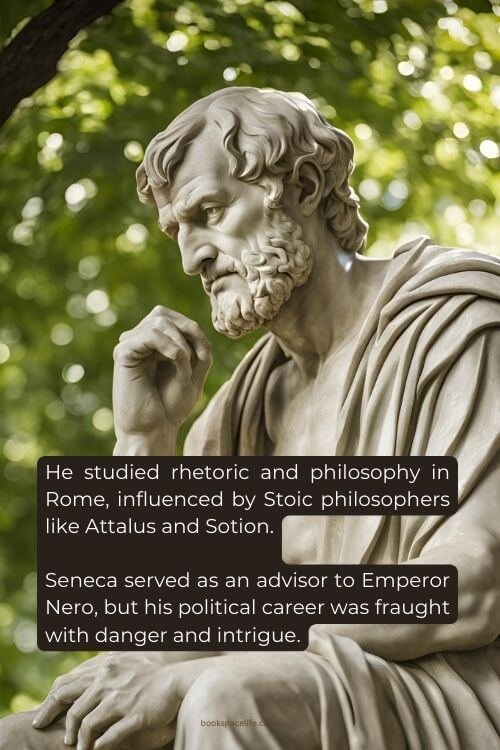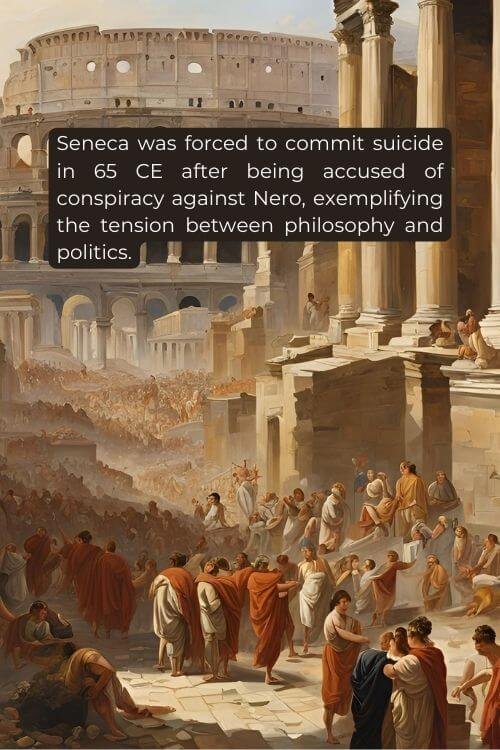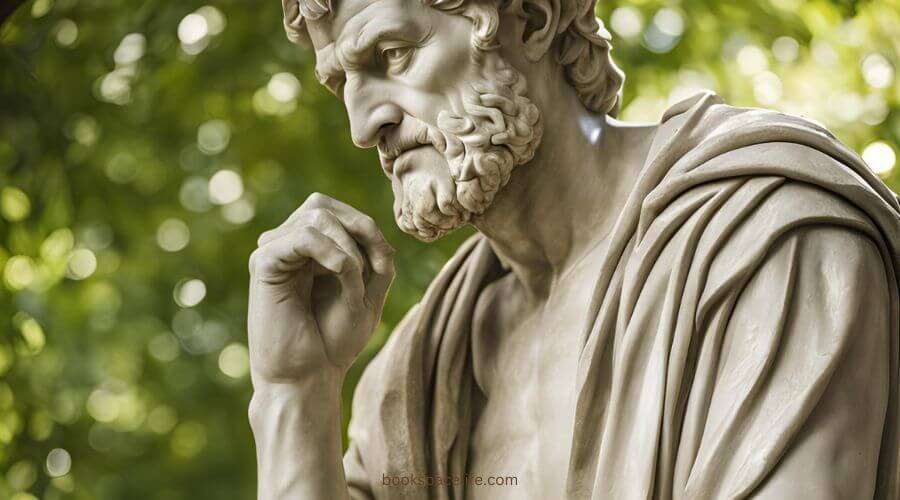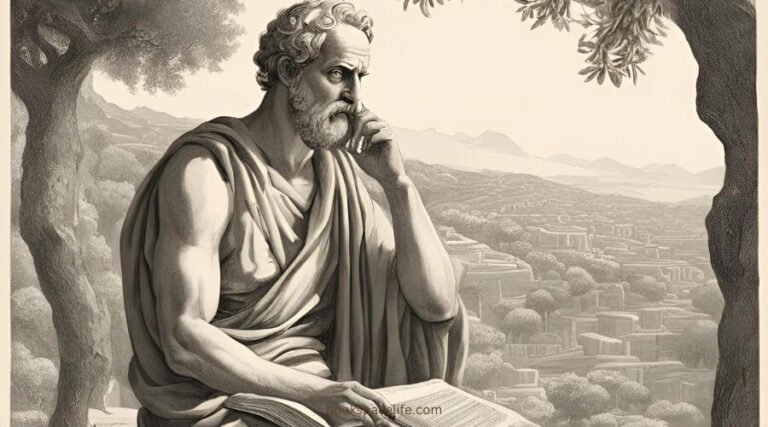Thales of Miletus
Seneca: The Stoic Philosopher of Rome
Lucius Annaeus Seneca, known simply as Seneca (4 BCE – 65 CE), is one of the most important figures in Stoic philosophy and a prominent writer of the Roman Empire.
His works, characterized by their eloquent prose and deep moral insight, have made significant contributions to philosophical thought and literature.
Seneca’s life was marked by political intrigue, personal tragedy, and a relentless quest for wisdom, and his ideas continue to resonate in modern discussions of ethics, resilience, and the human condition.
This blog post delves into Seneca’s early life, education, philosophical contributions, and enduring influence on Western thought.
Quick Read
Table of Contents
(1) Early Life and Education
Seneca was born in Corduba (modern-day Córdoba, Spain) around 4 BCE to a wealthy family.
His father, Seneca the Elder, was a well-known orator, and his mother, Helvia, was also educated, ensuring that Seneca and his siblings received a strong foundation in literature and rhetoric.
The family moved to Rome when Seneca was a young boy, where he received a comprehensive education that would shape his future as a philosopher and writer.
In Rome, Seneca studied under notable teachers, Attalus the Stoic, and Fabianus the Sextian, who introduced him to the works of earlier philosophers.
His education encompassed a broad range of subjects, including rhetoric, philosophy, and law, providing him with the intellectual tools necessary for his future career.
Seneca was particularly drawn to Stoicism, a philosophical school that emphasized rationality, virtue, and living in accordance with nature.
He was influenced by the teachings of earlier Stoics, such as Zeno of Citium and Epictetus, as well as the writings of Socrates and Plato.
This early exposure to Stoic thought would significantly influence his later writings and philosophical outlook.

(2) Political Career and Travels
Seneca’s career took a turn toward politics when he became involved in the Roman Senate. He held various political positions, including quaestor (responsible for financial matters) and aedile (responsible for maintaining the city’s infrastructure), and gained a reputation for his oratory skills.
However, his political life was fraught with danger, particularly due to the tumultuous nature of Roman politics during the reign of Emperor Nero.
In 41 CE, Seneca was accused of adultery with Julia Livilla, the sister of Emperor Caligula, and was forced into exile in Corsica.
This period of isolation proved to be a time of reflection and intellectual growth for Seneca.
During his eight years in exile, he wrote several philosophical essays and letters that explored themes of ethics, virtue, and the nature of happiness.
Seneca returned to Rome in 49 CE, where he became an advisor to the young Emperor Nero.
Initially, his influence on Nero was positive; he sought to temper the young ruler’s excesses and guide him towards a more benevolent reign.
However, as Nero became increasingly tyrannical, Seneca’s position became precarious. In 65 CE, he was implicated in a conspiracy against Nero and was ordered to commit suicide, a fate he accepted with remarkable stoicism.
Seneca’s life was marked by a paradox: a man deeply engaged in the political life of Rome yet dedicated to the pursuit of philosophical wisdom.
(3) Philosophy
Seneca’s philosophical writings encompass a wide range of topics, including ethics, morality, the nature of the good life, and the importance of reason.
His works reflect a practical approach to Stoicism, emphasizing the application of philosophical principles to everyday life. Some key aspects of Seneca’s philosophy include:
- The Nature of Happiness: Seneca believed that true happiness is found in virtue and self-control rather than in external possessions or status. He argued that happiness is a state of mind that can be cultivated through reason and ethical living.
- Emotional Resilience: Seneca’s writings often explore the management of emotions and the importance of maintaining equanimity in the face of adversity. He emphasized the need to confront and accept one’s emotions rather than be overwhelmed by them. His famous assertion, “We suffer more often in imagination than in reality,” speaks to the importance of perspective in navigating life’s challenges.
- The Value of Friendship: In his letters and essays, Seneca frequently discusses the importance of friendship and human connections. He believed that true friendship is based on mutual respect and shared values, serving as a source of support and comfort in difficult times.
- Death and the Nature of Life: Seneca viewed death as a natural part of life, advocating for a rational acceptance of mortality. He believed that contemplating death can lead to a deeper appreciation of life and the importance of living virtuously. His famous work, “On the Shortness of Life,” argues that life is not inherently short but rather that people often waste it through distraction and vice.
- Moral Improvement: Seneca encouraged self-examination and the continuous pursuit of moral improvement. He believed that individuals have the power to shape their character and make ethical choices, emphasizing the importance of personal responsibility.
Seneca’s philosophical works include “Letters to Lucilius,” a collection of essays addressing various moral and ethical dilemmas, and “On the Happy Life,” where he explores the nature of happiness and the role of virtue.
His writings are characterized by their accessibility and practicality, making Stoic philosophy relevant to a wide audience.

(4) Influence and Impact
Seneca’s influence extends far beyond his lifetime, shaping the course of Western philosophy and literature.
His ideas have had a profound impact on various fields, including ethics, psychology, and political thought. Some key aspects of his influence include:
- Stoicism in Later Thought: Seneca’s writings played a pivotal role in the revival of Stoicism during the Renaissance and the Enlightenment. His emphasis on rationality, ethics, and emotional resilience resonated with thinkers such as Descartes, Locke, and Montesquieu, who incorporated Stoic principles into their philosophies.
- Moral Philosophy: Seneca’s exploration of ethics and the nature of the good life has had a lasting impact on moral philosophy. His ideas about the importance of virtue, self-control, and the pursuit of happiness continue to be discussed and debated by contemporary philosophers.
- Influence on Christianity: Seneca’s thoughts on morality and ethics found resonance within early Christian teachings. His ideas about the nature of the good life, the importance of virtue, and the acceptance of suffering have parallels in Christian philosophy. Some scholars even suggest that Seneca’s writings influenced early Christian thinkers, including Augustine.
- Literary Legacy: As a playwright and essayist, Seneca’s influence on literature is significant. His tragedies, such as “Phaedra” and “Thyestes,” are notable for their exploration of intense emotions and moral dilemmas. His dramatic style and themes influenced later playwrights, including Shakespeare and Marlowe.
- Modern Psychology: Seneca’s emphasis on emotional resilience and the management of emotions has found a place in modern psychology, particularly in cognitive-behavioral therapy (CBT). His insights into the nature of human suffering and the importance of perspective resonate with contemporary approaches to mental health and well-being.
- Education and Rhetoric: Seneca’s works have been studied in educational institutions for centuries, serving as foundational texts in rhetoric and philosophy. His writings on the art of persuasion and effective communication remain relevant in modern educational curricula.
(5) Conclusion
Seneca’s life and philosophical contributions offer a profound exploration of the human experience, emphasizing the importance of virtue, reason, and emotional resilience.
His teachings encourage individuals to confront the challenges of life with dignity and to cultivate a moral character that aligns with Stoic principles.
As we navigate the complexities of modern life, Seneca’s insights continue to inspire and guide us.
His belief in the power of rational thought, ethical living, and the acceptance of mortality provides a timeless framework for achieving personal fulfillment and resilience.
In an era marked by uncertainty and distraction, Seneca’s philosophy serves as a reminder of the importance of introspection, self-improvement, and the pursuit of a virtuous life.
His legacy, rooted in the Stoic tradition, invites us to embrace the wisdom of the past as we strive to cultivate a more meaningful and ethical existence.
Through the lens of Seneca’s teachings, we can find guidance in our quest for happiness, purpose, and understanding in an ever-changing world.Top of Form
(A) 7 Quick Facts on Seneca
- Birthplace: Seneca was born around 4 BCE in Corduba (modern-day Córdoba), Spain, into a wealthy equestrian family.
- Education: He studied rhetoric and philosophy in Rome, influenced by Stoic philosophers like Attalus and Sotion.
- Political Career: Seneca served as an advisor to Emperor Nero, but his political career was fraught with danger and intrigue.
- Exile: He was exiled to Corsica in 41 CE on accusations of adultery, spending eight years away from Rome.
- Return to Rome: Seneca returned to Rome in 49 CE, regaining favor and becoming Nero’s tutor and advisor.
- Philosophical Works: He wrote numerous philosophical essays and letters, including “Letters to Lucilius” and “On the Shortness of Life.”
- Death: Seneca was forced to commit suicide in 65 CE after being accused of conspiracy against Nero, exemplifying the tension between philosophy and politics.
(B) 10 Quotes attributed to Seneca
- Luck is what happens when preparation meets opportunity. Emphasizing the importance of readiness in achieving success.
- It is not the man who has too little, but the man who craves more, that is poor. Highlighting the idea that true wealth comes from contentment, not material possessions.
- We suffer more often in imagination than in reality. Suggesting that anxiety and fear often stem from our thoughts rather than actual circumstances.
- A gem cannot be polished without friction, nor a man perfected without trials. Indicating that challenges are essential for personal growth and development.
- The whole future lies in uncertainty: live immediately. Encouraging people to embrace the present moment instead of worrying about the future.
- No man was ever wise by chance. Asserting that wisdom is the result of intentional thought and effort, not random occurrences.
- The greatest obstacle to living is expectancy, which hangs upon tomorrow and loses today. Warning against postponing life and experiences for an uncertain future.
- It is not how long we have lived, but how well we have lived. Stressing the quality of life over its duration.
- To wish to be well is a part of becoming well. Emphasizing the importance of a positive mindset in the journey to health.
- He who is brave is free. Linking courage with true freedom, suggesting that facing fears liberates the individual.








